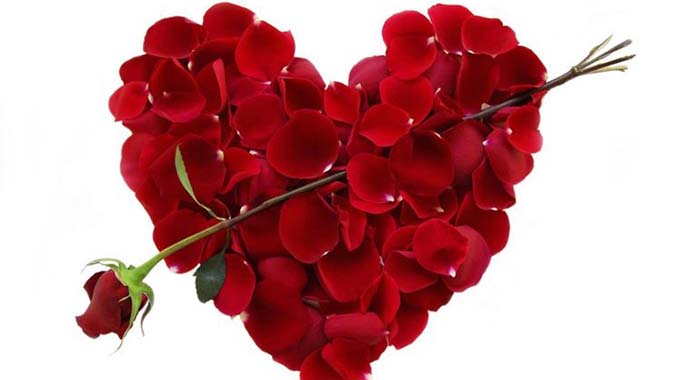Innovative ways of Loving on Valentine’s Day

Sekai Nzenza on Wednesday
There was a church gathering of women at Mai Mufundisi’s house in Harare last Friday night. Mai Mufundisi is the wife of the pastor of a rapidly growing Pentecostal church.
I was there with my niece Shuvai from the US, my cousin Piri and a couple of other women friends. We were women of various ages, backgrounds, married, never married, divorced and widowed or simply women in love and out of love.
This was Mai Mufundisi’s Valentine’s Day session to help educate young women like Shamiso, our young niece, who frequents her church. These women often ask Mai Mufundisi for marriage counselling.
“Ladies and no gentlemen, we are gathered here today to discuss innovative ways of loving on Valentine’s Day,” said Mai Mufundisi. She was a buxom light-skinned woman with short hair dyed ginger.
“Most people do not believe I am a pastor’s wife because I am too fashionable. But who says a pastor’s wife cannot wear makeup and nice clothes? At home, I sometimes wear sexy lingerie that my husband likes.” She made some suggestive bedroom movements and everyone laughed.
“Raise your hand if you have been in love,” said Mai Mufundisi. We looked at each other with some embarrassment, like we were some teenage girls attending lessons. Then slowly, we lifted our hands in the air, all 20 of us or more. I saw a few unraised hands.
“So, those who have been in love stand up and tell us what it feels like,” Mai Mufundisi said. For a brief moment, nobody stood up. Then Shuvai stood up. This girl has a lot of confidence. Living in America has instilled a certain courage and ability to speak her mind.
Shuvai was wearing a red top with no sleeves, tight jeans ripped at the knees and red lipstick to match her top. Her long dreadlocks hung loosely over the shoulders. Shamiso, who is about 24 years old now, pinched me gently and whispered,
“Nhasi tichanyadziswa. Dai tavasiya.” By this she meant that Shuvai was going to embarrass us. We should have left her behind. But I knew that Shamiso was not in the least embarrassed with Shuvai standing up in the middle of all these women like that.
By inviting us to this women-only church session, Shamiso’s hidden agenda was to show everyone that she has older aunts, vana tete, like Piri, Shuvai and I.
Knowing Shamiso, she would have told Mai Mufundisi that Shuvai and I had lived in the Diaspora, therefore we knew innovative ways of loving that could be shared with those who had never left Zimbabwe to find love elsewhere. Shuvai stood right there, in the middle of us all.
Speaking quite loudly with an American accent she said, “When you are in love, you have a feeling of joy and warmth towards a man. You want to be with him all the time. He makes you happy. You want to hold him, kiss him and even commit sins with him.” Everyone laughed. Mai Mufundisi too.
“And why do you want to sin with him? Why not wait until the time to do what is right comes so you do not sin?” Mai Mufundisi asked.
“Sometimes, the Devil forces you to eat the apple, the way Adam and Eve did in the Bible. Eve was the one who got into serious trouble with God for tempting Adam,” Shuvai said.
There were giggles everywhere. Shuvai continued, “Also, ladies, if you are over 35 like I am, I can tell you that in truth, the apple is not all that bad.
“The church should not give it such a bad name.” Mai Mufundisi struggled to control our laughter and noise. One woman then shouted, “Apple, what apple? Tell the children the truth.
“The village aunts and uncles are no longer there to teach young couples about love and marriage. The church is left to teach them. And how many people in the church have the knowledge, let alone the courage to do so? Vanoroorana vari mapofu ega ega mumba imomo,” said Piri, meaning the newlyweds are blind or ignorant about intimate issues when they get married.
“Okay ladies, why do you think we are having this session then? Give me my role as MC please and keep quiet,” Mai Mufundisi said. We listened.
“We are not talking about eating apples, though I plan to have a session on that subject another day. I want us to talk about innovative ways of expressing love to our husbands and partners on Valentine’s Day, on the 14th of February.”
Mai Mufundisi then gave us pieces of paper and asked us to write one or two sentences on what we were going to do for someone we love on Valentine’s Day.
“This is all discrete. Do not share your writing with anyone. We all want to learn from each other. Feel free to write your fantasies if you wish,” Mai Mufundisi said.
We got busy writing for a few minutes. Then we placed the pieces of paper in a little basket for Mai Mufundisi to pick and read out randomly. The first note said, “I want to learn how to kiss my husband on Valentine’s Day. Please tell me how I can do it. Ndini Mai Kissmore.” Shuvai laughed the loudest.
“Kiss? Anoda kiss? Ine basa rei?” said Piri, loudly. Kiss, she wants a kiss. What is the point of kissing?
“Poor girl,” said someone in the group who did not stand up to be seen. Kiss is the meaning of love and romance. You cannot be taught how to kiss, it comes naturally.” Then everyone started talking to each other and the place became noisy again.
One woman stood up. She was possibly over 50 years old. She said our African men do not often find kissing as a natural part of loving. These men with a strong rural background or the SRB were not taught how to kiss.
A woman in her late 20s or perhaps early 30s, stood up, holding a baby boy in her arms. She said, “Village background is no excuse. No. These men must kiss us. Kissing comes from a feeling of love within you, when you want to connect with your loved one physically, emotionally and even spiritually. If he does not kiss you, he does not love you, full stop!”
Another much older woman stood up and said it was unfair to suggest that men in the village were not romantic because they did not kiss. The village men knew how to sing love poetry that could surpass the taste of kissing.
“What love poetry was that?” asked someone. Mai Mufundisi then pointed to a much older woman sitting at the back. She said to her, “Mbuya Ethel, please stand up and tell these girls about what love was like in the past.”
Mbuya Ethel began by saying she was an old school teacher. She said long before we knew about Valentine’s Day, praise poetry or detembo was an expression of love and affection.
She explained at length that these songs of love or courtship were encapsulated in the praise poetry of our village past, mumadetembedzo ne ndyaringo dzokupfimbana. Some young women did not seem to listen at all to Mbuya Ethel.
They looked bored. But some of us who grew up in the village remembered the time when we read Shona romantic poetry in high schools.
We clapped hands to thank Mbuya Ethel. Mai Mufundisi continued picking more notes from the basket.Most of the notes referred to what the women wanted from their partners on Valentine’s Day, and not so much on what they would do for their husbands, boyfriends or partners.
The young women said they wanted money, chocolates, perfumes, flowers, champagne, strawberries and nice lingerie on Valentine’s Day.
“But what innovative ways of loving will you do for him?” asked Mai Mufundisi. One very pretty dark-skinned young woman with a shaved head and big earrings stood up. She wore a purple and orange African caftan dress.
She flashed her engagement ring for us to see. Then she said, “On Valentine’s Day, I will cook a traditional meal for him. I will serve him his dinner dressed like this.”
She slowly took off her caftan dress and dropped it on the ground, revealing a very short skirt and another matching piece of cloth covering her rather large breasts.
There were several rows of colourful beads around her waistline. She even wore copper bracelets around her ankles. This was a pre-colonial traditional outfit worn by Shona girls before the white man and the missionaries came here.
Shuvai quickly stood up and clapping her hands, she shouted, “Talk about being innovative. Go girl! Beads and all! No wig, no nothing. Now, that’s what I call a natural beauty. One lucky guy is sure gonna have a real African Valentine’s Day!”
Dr Sekai Nzenza is a writer and cultural critic










Comments